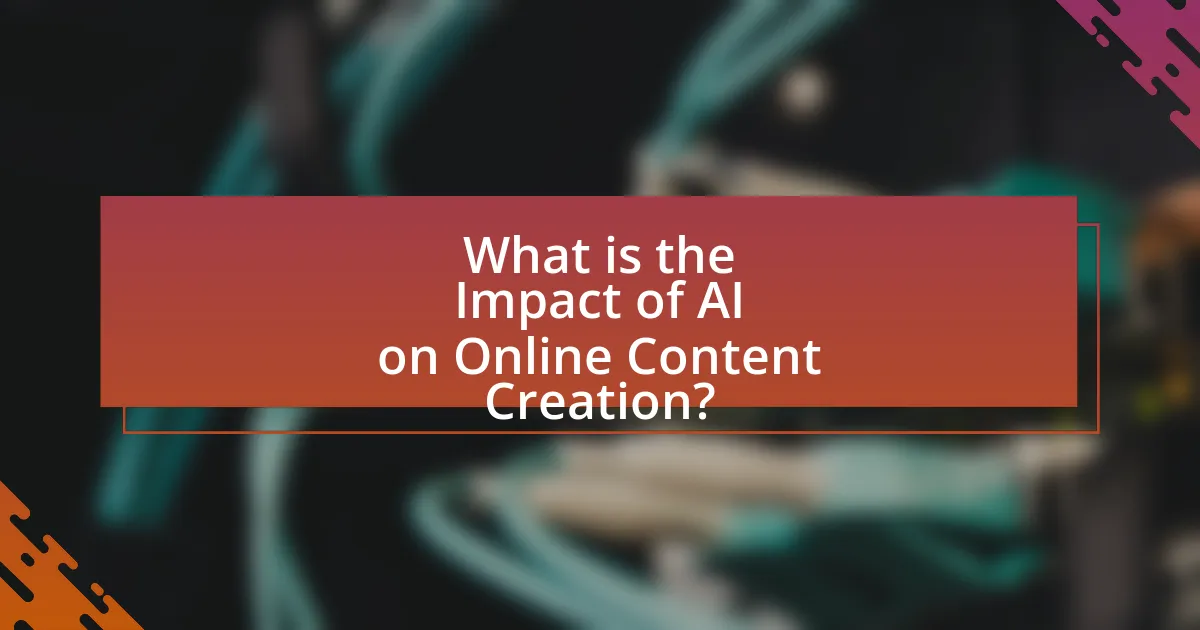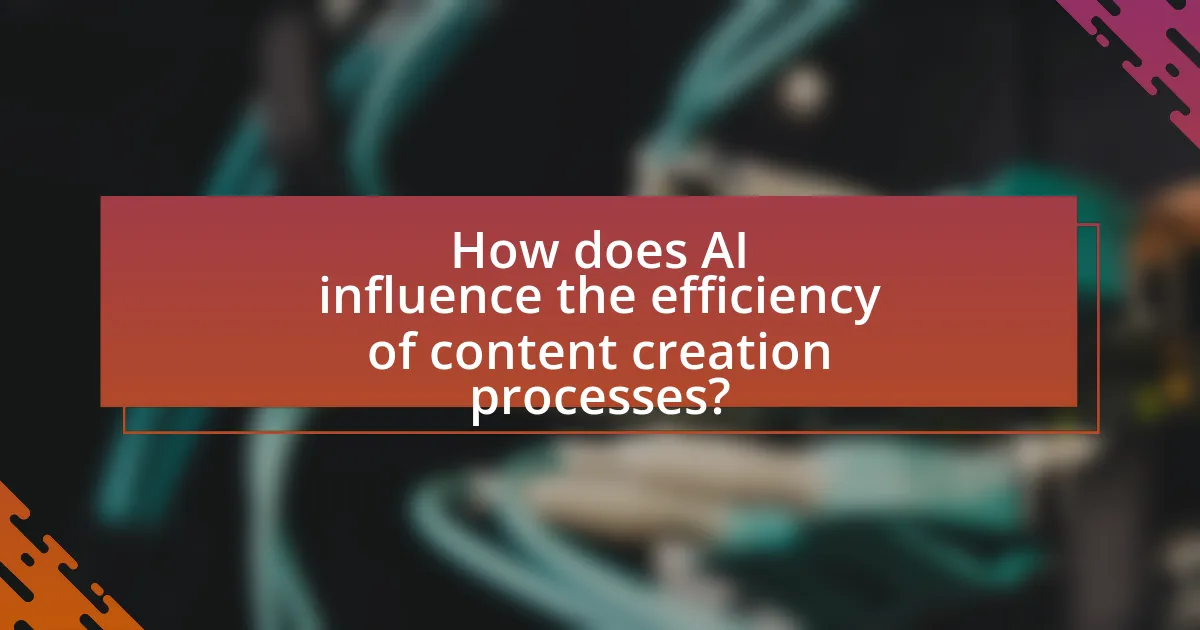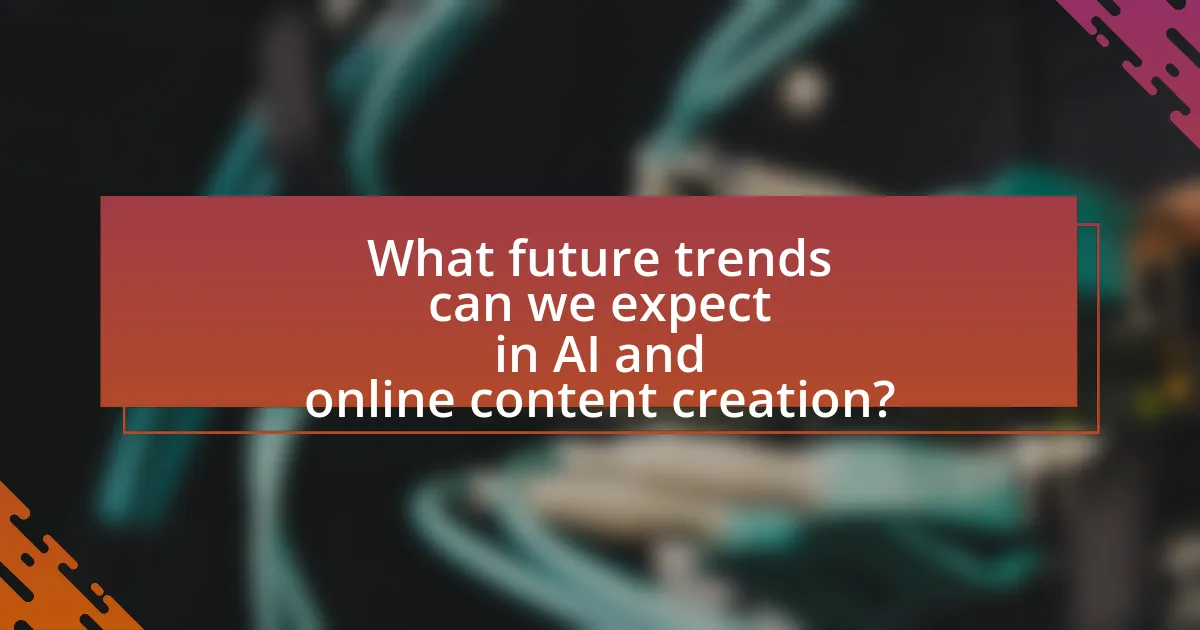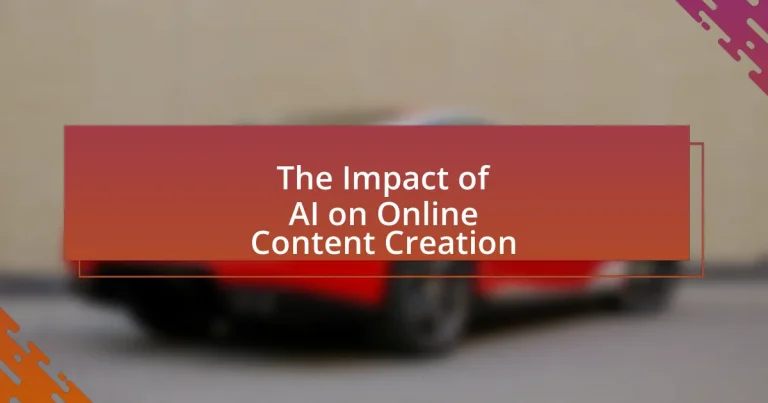The article examines the significant impact of artificial intelligence (AI) on online content creation, highlighting its role in enhancing efficiency, personalization, and scalability. It discusses the evolution of AI technology from basic text generation to advanced models capable of producing high-quality, contextually relevant content. Key advancements such as natural language processing and machine learning algorithms are explored, along with their applications in automated content generation, personalized recommendations, and content curation. The article also addresses challenges related to originality, quality control, and ethical considerations, while emphasizing the importance of human-AI collaboration in improving content production processes. Future trends indicate a growing reliance on AI tools, which are expected to further transform the landscape of content creation.

What is the Impact of AI on Online Content Creation?
The impact of AI on online content creation is significant, as it enhances efficiency, personalization, and scalability. AI tools can automate repetitive tasks such as content generation, editing, and optimization, allowing creators to focus on more strategic aspects of their work. For instance, AI-driven platforms like OpenAI’s GPT-3 can generate high-quality text, enabling marketers to produce articles and social media posts rapidly. Additionally, AI algorithms analyze user data to tailor content to specific audiences, improving engagement rates. According to a report by McKinsey, companies that leverage AI in their content strategies can see productivity increases of up to 40%. This demonstrates that AI not only streamlines the content creation process but also drives better outcomes for businesses.
How has AI technology evolved in the context of content creation?
AI technology has evolved significantly in the context of content creation by advancing from basic text generation to sophisticated models capable of producing high-quality, contextually relevant content. Initially, AI tools like rule-based systems could only generate simple text based on predefined templates. However, with the introduction of machine learning and natural language processing techniques, particularly transformer models such as OpenAI’s GPT-3, AI can now understand context, tone, and style, enabling it to create diverse content types, including articles, marketing copy, and social media posts. This evolution is evidenced by the rapid adoption of AI-driven content creation tools in various industries, with a report from MarketsandMarkets indicating that the AI content creation market is projected to grow from $1.5 billion in 2020 to $10.1 billion by 2026, highlighting the increasing reliance on AI for efficient and scalable content production.
What are the key advancements in AI that influence content creation?
Key advancements in AI that influence content creation include natural language processing (NLP), machine learning algorithms, and generative models. NLP enables machines to understand and generate human language, facilitating automated content generation and enhancing user engagement. Machine learning algorithms analyze vast amounts of data to identify trends and preferences, allowing for personalized content recommendations. Generative models, such as OpenAI’s GPT-3, can create coherent and contextually relevant text, significantly reducing the time and effort required for content production. These advancements have transformed how content is created, optimized, and distributed across various platforms, leading to more efficient and targeted communication strategies.
How do these advancements change the way content is produced?
Advancements in AI significantly change the way content is produced by automating various aspects of the creation process. AI tools can generate text, images, and videos, allowing creators to produce high-quality content more efficiently and at scale. For instance, natural language processing algorithms can analyze vast amounts of data to generate relevant articles or social media posts in seconds, reducing the time and effort required by human writers. Additionally, AI-driven analytics can provide insights into audience preferences, enabling content creators to tailor their output to meet specific demands. This shift not only enhances productivity but also allows for more personalized and engaging content, as evidenced by the increasing use of AI in platforms like Jasper and Canva, which streamline content creation for users.
What are the primary applications of AI in online content creation?
The primary applications of AI in online content creation include automated content generation, personalized content recommendations, and enhanced content curation. Automated content generation utilizes natural language processing algorithms to create articles, blogs, and social media posts, significantly reducing the time and effort required for content production. For instance, tools like OpenAI’s GPT-3 can generate coherent and contextually relevant text based on prompts, demonstrating the effectiveness of AI in this area. Personalized content recommendations leverage machine learning algorithms to analyze user behavior and preferences, enabling platforms to suggest tailored content that increases engagement. Research by McKinsey & Company indicates that personalized recommendations can lead to a 10-30% increase in sales for online retailers. Enhanced content curation employs AI to sift through vast amounts of data, identifying and organizing relevant information for users, thereby improving the overall content discovery experience. These applications illustrate how AI is transforming online content creation by increasing efficiency, personalization, and user engagement.
How does AI assist in content generation and writing?
AI assists in content generation and writing by automating the creation of text, enhancing productivity, and improving content quality. Tools like natural language processing algorithms analyze existing content to generate new articles, blog posts, and marketing copy efficiently. For instance, OpenAI’s GPT-3 can produce coherent and contextually relevant text based on prompts, significantly reducing the time required for writers to brainstorm and draft. Additionally, AI can optimize content for SEO by suggesting keywords and structuring articles to improve search engine rankings, which is supported by studies showing that AI-generated content can achieve higher engagement rates.
What role does AI play in content curation and personalization?
AI plays a crucial role in content curation and personalization by analyzing user data to deliver tailored content experiences. Through machine learning algorithms, AI can assess user preferences, behaviors, and interactions, enabling platforms to recommend relevant articles, videos, and products. For instance, Netflix utilizes AI to analyze viewing habits, resulting in personalized recommendations that enhance user engagement and satisfaction. This data-driven approach not only improves user experience but also increases content consumption, as evidenced by a report from McKinsey, which states that personalized recommendations can lead to a 10-30% increase in revenue for businesses.
What challenges does AI present in online content creation?
AI presents several challenges in online content creation, including issues of originality, quality control, and ethical considerations. Originality is compromised as AI-generated content can inadvertently replicate existing works, leading to plagiarism concerns. Quality control is another challenge, as AI may produce content that lacks depth, nuance, or context, resulting in lower engagement and effectiveness. Ethical considerations arise from the potential misuse of AI for generating misleading or harmful content, which can damage credibility and trust. These challenges necessitate careful oversight and integration of human expertise to ensure that AI tools enhance rather than hinder the content creation process.
How does AI impact the quality and authenticity of content?
AI significantly enhances the quality and authenticity of content by enabling more accurate data analysis and personalized content generation. Through natural language processing and machine learning algorithms, AI can analyze vast amounts of information to produce high-quality, relevant content tailored to specific audiences. For instance, a study by McKinsey & Company found that companies using AI for content creation reported a 20% increase in engagement rates due to improved relevance and personalization. Additionally, AI tools can help verify facts and sources, thereby increasing the authenticity of the content produced. This capability is crucial in combating misinformation, as AI can cross-reference data against reliable databases, ensuring that the content adheres to factual accuracy.
What ethical considerations arise from using AI in content creation?
The ethical considerations arising from using AI in content creation include issues of authorship, misinformation, bias, and transparency. Authorship concerns emerge as AI-generated content raises questions about who owns the rights to the material, complicating traditional notions of intellectual property. Misinformation is a significant risk, as AI can produce content that appears credible but is factually incorrect, potentially misleading audiences. Bias in AI algorithms can lead to the perpetuation of stereotypes or exclusion of diverse perspectives, impacting the fairness of the content produced. Lastly, transparency is crucial; users must be informed when content is AI-generated to maintain trust and accountability in media. These considerations highlight the need for ethical guidelines and regulations in the deployment of AI technologies in content creation.

How does AI influence the efficiency of content creation processes?
AI significantly enhances the efficiency of content creation processes by automating repetitive tasks and providing data-driven insights. For instance, AI tools can generate written content, optimize SEO, and analyze audience engagement metrics, which reduces the time and effort required for content production. According to a study by McKinsey, organizations that leverage AI in their content strategies can increase productivity by up to 40%. This efficiency gain allows content creators to focus on higher-level strategic tasks, ultimately leading to more effective and engaging content.
What tools and platforms utilize AI for content creation?
Tools and platforms that utilize AI for content creation include OpenAI’s ChatGPT, Jasper, Copy.ai, and Writesonic. These tools leverage natural language processing algorithms to generate text, assist in writing, and enhance content marketing strategies. For instance, OpenAI’s ChatGPT can produce coherent and contextually relevant text based on user prompts, while Jasper offers templates for various content types, demonstrating the effectiveness of AI in streamlining the writing process.
How do these tools enhance productivity for content creators?
AI tools enhance productivity for content creators by automating repetitive tasks, streamlining workflows, and providing data-driven insights. For instance, AI-powered writing assistants can generate content drafts, suggest edits, and optimize for SEO, allowing creators to focus on higher-level creative processes. Additionally, tools like social media schedulers analyze audience engagement patterns, enabling creators to post at optimal times, thus maximizing reach and interaction. Research indicates that content creators using AI tools can increase their output by up to 50%, demonstrating a significant boost in efficiency and effectiveness in content production.
What features do these AI tools offer to streamline workflows?
AI tools offer features such as automation of repetitive tasks, real-time collaboration, and data analysis to streamline workflows. Automation reduces manual effort by handling tasks like content scheduling and social media posting, which increases efficiency. Real-time collaboration allows multiple users to work simultaneously on projects, enhancing productivity and communication. Data analysis features provide insights into audience engagement and content performance, enabling creators to make informed decisions and optimize their strategies. These functionalities collectively enhance workflow efficiency in online content creation.
How does AI affect the collaboration between humans and machines in content creation?
AI enhances collaboration between humans and machines in content creation by automating repetitive tasks and providing data-driven insights. This synergy allows human creators to focus on higher-level creative processes while AI tools assist in generating content, optimizing workflows, and analyzing audience engagement. For instance, AI algorithms can analyze vast amounts of data to suggest trending topics or optimize headlines, which improves the efficiency and effectiveness of content production. Studies show that 70% of marketers believe AI significantly improves their content strategy, demonstrating its impact on collaborative efforts in the field.
What are the benefits of human-AI collaboration in content production?
Human-AI collaboration in content production enhances efficiency, creativity, and personalization. By leveraging AI’s ability to analyze vast amounts of data, content creators can gain insights into audience preferences and trends, leading to more targeted and relevant content. For instance, a study by McKinsey found that companies using AI in their content strategies saw a 20% increase in engagement rates. Additionally, AI tools can assist in automating repetitive tasks, allowing human creators to focus on higher-level creative processes, thus improving overall productivity. This synergy not only streamlines workflows but also fosters innovative content that resonates with audiences.
How can content creators effectively integrate AI into their processes?
Content creators can effectively integrate AI into their processes by utilizing AI tools for content generation, data analysis, and audience engagement. For instance, AI-driven platforms like OpenAI’s GPT-3 can assist in drafting articles, generating ideas, and enhancing creativity through suggestions based on existing content. Additionally, AI analytics tools can analyze audience behavior and preferences, allowing creators to tailor their content more effectively. Research from McKinsey indicates that companies using AI in marketing can increase their productivity by 20-30%, demonstrating the tangible benefits of AI integration in content creation.

What future trends can we expect in AI and online content creation?
Future trends in AI and online content creation include increased automation, enhanced personalization, and improved content generation capabilities. Automation will streamline the content creation process, allowing creators to focus on strategy and creativity while AI handles repetitive tasks. Enhanced personalization will enable AI to analyze user data and preferences, delivering tailored content that resonates with individual audiences. Improved content generation capabilities will lead to more sophisticated AI tools that can produce high-quality text, images, and videos, making it easier for creators to generate diverse content quickly. According to a report by McKinsey, companies that leverage AI in content creation can see productivity increases of up to 40%, highlighting the significant impact AI will have on the industry.
How will AI continue to evolve in the content creation landscape?
AI will continue to evolve in the content creation landscape by enhancing personalization, improving efficiency, and enabling more sophisticated content generation techniques. As AI algorithms become more advanced, they will analyze user data to create tailored content that resonates with specific audiences, thereby increasing engagement. For instance, tools like OpenAI’s GPT-3 have already demonstrated the ability to generate human-like text, and future iterations are expected to refine this capability further, allowing for more nuanced and context-aware content. Additionally, AI will streamline the content creation process by automating repetitive tasks, such as editing and formatting, which will allow creators to focus on higher-level strategic thinking. According to a report by McKinsey, companies that leverage AI in their content strategies can see productivity increases of up to 40%. This trend indicates that AI’s role in content creation will not only grow but will also fundamentally transform how content is produced and consumed.
What emerging technologies may influence AI’s role in content creation?
Emerging technologies such as natural language processing advancements, generative adversarial networks, and augmented reality are likely to significantly influence AI’s role in content creation. Natural language processing improvements enable AI to generate more coherent and contextually relevant text, enhancing the quality of written content. Generative adversarial networks facilitate the creation of realistic images and videos, allowing AI to produce multimedia content that engages audiences more effectively. Augmented reality technologies provide immersive experiences, enabling AI to create interactive content that blends digital elements with the real world. These technologies collectively enhance AI’s capabilities, making it a more powerful tool for content creators across various platforms.
How might audience expectations change with AI-generated content?
Audience expectations may shift towards a demand for higher quality and more personalized content with the rise of AI-generated material. As AI technology improves, audiences will likely expect content that is not only relevant but also tailored to their preferences, reflecting a deeper understanding of their interests and behaviors. Research indicates that 70% of consumers prefer personalized content, suggesting that AI’s ability to analyze data and generate customized outputs will significantly influence audience expectations. Consequently, audiences may become less tolerant of generic or low-quality content, leading to a higher standard for engagement and relevance in the digital landscape.
What best practices should content creators follow when using AI?
Content creators should prioritize transparency, accuracy, and ethical considerations when using AI. Transparency involves clearly disclosing the use of AI tools in content creation, which builds trust with the audience. Accuracy is essential, as AI-generated content must be fact-checked to ensure reliability; studies show that misinformation can significantly harm credibility. Ethical considerations include avoiding plagiarism by ensuring that AI-generated content is original and properly attributed. Following these best practices not only enhances the quality of content but also fosters a responsible approach to AI utilization in the creative process.
How can creators ensure the quality of AI-generated content?
Creators can ensure the quality of AI-generated content by implementing rigorous review processes and utilizing feedback mechanisms. Establishing a multi-step review process allows creators to evaluate the accuracy, relevance, and coherence of the content produced by AI. For instance, a study by the Stanford University researchers highlighted that human oversight significantly improves the reliability of AI outputs, as human reviewers can identify contextual errors that AI may overlook. Additionally, incorporating user feedback helps refine AI models, ensuring that the generated content aligns with audience expectations and standards. This approach not only enhances the quality of the content but also fosters trust among users.
What strategies can be employed to maintain authenticity in AI-assisted content?
To maintain authenticity in AI-assisted content, creators should prioritize human oversight, transparency, and personalization. Human oversight ensures that content is reviewed and refined by individuals who can inject personal insights and context, which AI may lack. Transparency involves disclosing the use of AI in content creation, allowing audiences to understand the source and nature of the information. Personalization tailors content to reflect the unique voice and perspective of the creator, making it resonate more with the audience. Research indicates that content perceived as authentic leads to higher engagement rates, with a study by the Content Marketing Institute showing that 86% of consumers value authenticity in brand messaging.




